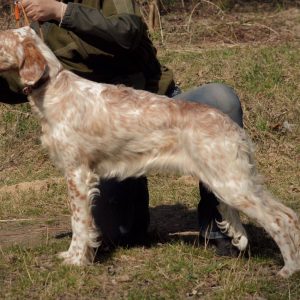
English Setter
This medium sized dog has a beautiful silky coat, floppy ears, and a stunning plumed tail. Originally bred for hunting, the English Setter is friendly, clever and gentle, though prone to mischief at times. They get on well with just about everyone, and are very good with children. Since they are a working breed, English Setters love to be active, so make sure to give your English Setter attention and exercise.
English Setter breed attributes
About English Setter breed
Description
The English Setter is a medium sized breed that is part of the gun dog group. They are naturally athletic, with deep chests, straight backs, and powerful haunches. The English Setter has low-set floppy ears, large bright eyes, and a kind, clever expression. The lips are slightly pendulous, the muzzle is square, and the teeth meet in an even scissor bite. The English Setter’s long and graceful neck leads down to a level back. The tail is slightly curved, and covered in silky fur that hangs like a banner. The legs are straight and muscular, ending in fuzzy, well-arched paws.
Origin: England
Look
The English Setter has a luxurious silky coat. The hair is neither woolly nor curly, but straight and sleek. There is feathered on the ears, chest, belly, tail, and backs of the legs. This breed sheds moderately, but does need regular brushing to avoid knots and tangles. Most English Setter should be brushed two to three times a week with a bristle brush and metal comb. Regular trims on the face and feet will help your dog to look tidy.
This breed has several typical coat patterns: white with another colour flecked throughout the coat (this pattern is described as belton). These include orange and white (orange belton), black and white (blue belton), liver and white (liver belton), lemon and white (lemon belton), and tricolour.
Health
While generally a healthy and long-lived breed, the English Setter may develop one or more of the following health issues:
-
- Allergies
- Autoimmune thyroiditis
- Deafness
- Elbow dysplasia
- Hip dysplasia
- Hypothyroidism
At Newdoggy.com, we recommend that you buy your dog from reputable breeders, who use genetic testing and good breeding practices to remove genetic conditions from their breeding lines.
Learning
Friendly and intelligent, the English Setter is fairly easy to train. Since these dogs are rather sensitive, avoid harsh training methods. Instead, opt for positive reinforcement training. The English Setter’s keen senses means they are easily distracted, especially if you are training outdoors. Working-line Setters are thought to be more stubborn and cheeky, and will keep you on your toes!
Young English Setters are curious by nature, and it’s all too easy for them to accidentally break or damage something. You will need to plan ahead and keep fragile or valuable objects out of the way until your young English Setter has learnt the rules. You may also find the your young English Setter is a little difficult to toilet train.
As English Setters tend to bark when visitors arrive, it is worth teaching them “speak” and “quiet”. It is all too easy for barking to become a nuisance behaviour, so do not encourage barking.
Temperament
This breed is sweet and gentle. English Setters tend to be affectionate, friendly dogs, though also rather lively and playful. They can be a little protective of their home and family, but will calm down if you tell them to. As they tend to be sensitive, socialisation from a young age is important to build their confidence.
Living with
This is not a dog for the lazy! The English Setter is playful and full of energy. You should take your English Setter for a daily walk or run, or perhaps to a large garden or fenced field to play. Some owners like to cycle with the English Setter running next to them. Until your English Setter is fully mature, avoid high-impact exercise as your dog may inadvertently hurt themselves.
The English Setter is an excellent family dog. They are patient and kind with children, ad get along well with other dogs. This is a sociable breed, and should be part of the family. If left alone for too long, or kept away from the family, your English Setter may become depressed and lonely.
English Setters cope well with both heat and cold. As they are energetic, they are not the best dogs for apartment life. It might be possible to keep an English Setter in an apartment if you create a good exercise routine for your dog. As the English Setter is curious, independent, and loves to roam, be careful about letting them off-leash: there is a good chance that they will run off! English Setters love to dig and jump, so make sure your yard or garden has a secure fence or wall to prevent escape attempts.
Find English Setter Puppies for Sale
New litter alert
Please fill in the below form and we will let you know when a new English Setter litter arrives.

















